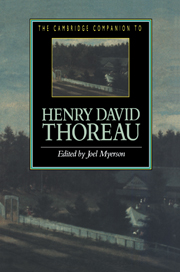Book contents
- Frontmatter
- 1 Thoreau’s reputation
- 2 Thoreau and Concord
- 3 Thoreau and Emerson
- 4 A Week on the Concord and Merrimack Rivers
- 5 Thoreau as poet
- 6 Thoreau and his audience
- 7 Walden
- 8 Thoreau in his Journal
- 9 The Maine Woods
- 10 A wild, rank place
- 11 Thoreau’s later natural history writings
- 12 Thoreau and the natural environment
- 13 Thoreau and reform
- Further reading
- Index
- Series List
10 - A wild, rank place
Thoreau’s Cape Cod
Published online by Cambridge University Press: 28 May 2006
- Frontmatter
- 1 Thoreau’s reputation
- 2 Thoreau and Concord
- 3 Thoreau and Emerson
- 4 A Week on the Concord and Merrimack Rivers
- 5 Thoreau as poet
- 6 Thoreau and his audience
- 7 Walden
- 8 Thoreau in his Journal
- 9 The Maine Woods
- 10 A wild, rank place
- 11 Thoreau’s later natural history writings
- 12 Thoreau and the natural environment
- 13 Thoreau and reform
- Further reading
- Index
- Series List
Summary
To most people who recognize the name, Thoreau conjures up his famed Walden, but those who appreciate his acute powers of observation and his ability to translate the wonder of what he sees into memorable prose quickly find their way to other of his works. Some become dedicated readers of A Week on the Concord and Merrimack Rivers, as meandering a book as the streams it describes, as they seek hints in this early work of how better to understand what came next.' But at least as many find their way to The Maine Woods and Cape Cod, posthumously published “travel ” books in whose essays they find the same authority and eloquence as in Walden, if not at quite so sustained a level.
Both The Maine Woods and Cape Cod have at their center Thoreau’s encounters with the wilderness he so movingly describes in the penultimate chapter of Walden, where he speaks of man’s "need to witness [his[ own limits transgressed." "Man can never have enough of nature," he observes, and "must be refreshed by the sight of inexhaustible vigor, vast and Titanic features, the seacoast with its wrecks, the wilderness with its living and its decaying trees, the thunder cloud, and the rain which lasts three weeks and produces freshets" (W 318). Thoreau did not like to leave to the imagination what he might experience firsthand: The Maine Woods treats one of these wilderness landscapes, Cape Cod another.
- Type
- Chapter
- Information
- The Cambridge Companion to Henry David Thoreau , pp. 142 - 151Publisher: Cambridge University PressPrint publication year: 1995
- 2
- Cited by

